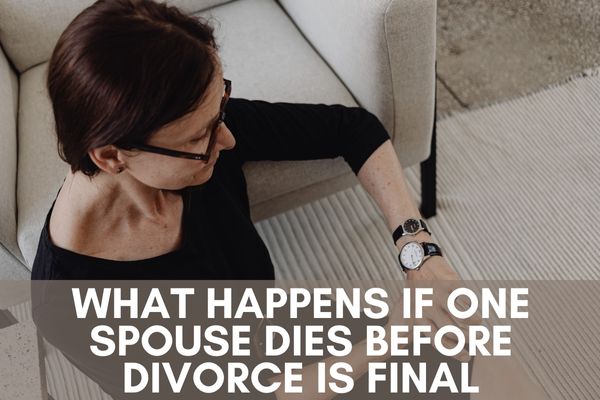In the divorce process, what happens If one spouse dies before divorce is final This article will expose you to the truth. Read the report carefully, and you will find the answer to this question.
What Happens If One Spouse Dies Before Divorce Is Final
Even if your divorce is only partially resolved, the process will finish if one spouse passes away before the judge grants you a divorce.
Before a judge issues the final judgment and the court approves the terms of the divorce, the divorce is not legally binding. Only while your spouse is still alive is this possible.
When a partner dies, divorce proceedings come to an end. The divorce case must end if one of the spouses passes away in the middle of it. If the other partner has passed away, you cannot move forward with the divorce.
What happens if one spouse dies before the divorce is final? From the perspective of the law, you won’t be a divorcee; you’ll be a widow or widower. If your partner declines to sign the divorce documents, you can still proceed with the case, but you cannot if they passes away during the divorce proceedings.
If one party dies, the most typical scenario is that the court will dismiss the case and deny a divorce. However, in some states, the lawsuit to divide marital property may still go forward in family court. In some areas, the family court may transfer the matter to the probate court so it can manage the deceased spouse’s assets.
As a widow or a widower, there will be no incentive to pursue a divorce. The court hearing the case can dismiss the application for divorce or transfer the case to another court. This is what happens if one spouse dies before the divorce is final.
What happens if one spouse dies before the divorce is final? If one party fails, the most typical scenario is that the court will dismiss the case and deny a divorce. However, in some states, the lawsuit to divide marital property may still go forward in family court.
In some areas, the family court may transfer the matter to the probate court so it can manage the deceased spouse’s assets. However, no court will award a divorce if one spouse has passed away.
Does Death Count As A Divorce?
From the perspective of the law, you won’t be a divorcee; you’ll be a widow or widower.
If your partner declines to sign the divorce documents, you can still proceed with the case, but you cannot if they passes away during the divorce proceedings. As a widow or a widower, there will be no incentive to pursue a divorce.

If Your Spouse Dies, Are You Still Married?
Finding out whether a widow is addressed as Ms., Mrs., or something entirely different might be challenging if you or someone you know has recently lost their marriage. Another query you could have is, “Is a bereaved person still considered married?” A newly widowed person may experience a lot of psychological and social confusion due to this and other status changes.
Your personal preference will determine whether you identify as a widow, a widower, or a widowed spouse. After your spouse passes away, you are no longer considered legally married. From a spiritual perspective, you typically repeat vows that state that you are wed “till death do us part” or in religious weddings.
However, there are things to keep in mind.
- A person who has lost their spouse might have vowed to continue living as though they are “married” even after their partner passes away.
- In social settings, one’s marital status is a matter of personal preference.
- If a widow still believes they are married, they will tell you.
- Legally, the contractual marriage is dissolved and no longer exists when a partner passes away.

What Happens If Someone Dies While Going Through A Divorce?
You will continue to be legally wed to your estranged partner until the decree absolute, which officially dissolves your marriage, is issued. However, the divorce process will terminate if your spouse dies before this has been finalized because there is no longer a marriage to dissolve.
There will be no reason for a widow or widower to seek a divorce. The court hearing the case can reject the divorce petition or send it to a different court. If a spouse passes away before the divorce is finalized, this is what occurs.

Can I Claim The Death Benefit Of My Husband Even Though We Are Separated But Not Legally?
Yes. If the marriage is still legally binding when one of the couple members dies, a legal separation will not affect a person’s eligibility for widow(er) benefits.
If you were living away from your spouse but didn’t have a legal separation agreement or divorce, you and your spouse are still considered married in the eyes of the law. As a result, you continue to be entitled to the proper portion of your deceased spouse’s assets (possessions).
Only relationships that started before the dead pensioner’s retirement and persisted through their mutual deaths will qualify a spouse or partner for a benefit. According to the website, the only exceptions are if the member received a disability pension or a dependent child was born.
The remaining spouse must submit a legal declaration stating that the marriage has not been dissolved following the death of a member.
If the deceased partner’s successor in interest (often the estate) continues to partake in the partnership’s gains and losses, the two-person partnership is not terminated.
Whether or not you were married when your partner passed away will affect your inheritance rights (or those of a civil partnership).
If you and your partner were cohabiting but not engaged in a civil union or married, you would only automatically inherit from them if they transferred something to you in a legally binding will.
Divorce Settlement After Death
The divorce situation: You cannot divorce someone who has passed away. In other words, if one of the divorcing parties passes away, so does the divorce case. The divorce will be annulled, and the survivor will become a widow or a widower.
If the decedent leaves judge evaluates it, and the estate executor will ensure that the assets are divided by the decedent’s desires. Without a will, the estate would go to the surviving spouse.
When it comes to debt, if you shared responsibility for it while your spouse was still alive, you are still liable. You are exempt from personal obligation if your partner has debts in their name alone. But before the assets are given to the beneficiaries, creditors who have claims against the estate will be compensated.
Enforcing Divorce Decree After Death
What is a divorce decree?
Legal separations can be stressful on many levels: psychologically, physically, spiritually, emotionally, and financially. A lot of baggage must be handled when going through a divorce, from determining a new custody schedule for the kids to deciding who should get what property.
Even if you and your spouse have the best intentions, there will inevitably be bumps in the road and heartaches.
The final written decision from the court that ends a marriage formally and legally is known as a divorce decree. It is a formal court order declaring the dissolution of your wedding, the terms of any agreements or charges, and the rights each of you have.
You and your ex-spouse will have a divorce decree when everything is resolved, and the air has cleared.
What Actions To Take If Your Ex Refuses To Obey The Terms Of The Divorce
Look over the decree to identify which requirements the ex-spouse has broken. Such breaches include making spousal maintenance or child support payments after the due date. It’s possible that the ex-spouse disobeyed the judge’s orders on parental leave or child custody.
Or perhaps there was a violation of the property distribution orders. For instance, failing to transfer title to real estate or other assets as ordered by the judge during the divorce may constitute a crime committed by an ex-spouse. Keep a record of these offenses to help your case.
Also, having strong proof of the other party’s violations of the divorce decision is essential to facilitating an effective court intervention. Written conversations and financial records are examples of the kinds of documentation that might be used to demonstrate the ex-spouse’s disregard for the agreement.
When court enforcement occurs, these crucial documents will support the aggrieved party’s case. The aggrieved party has the burden of proof. Be ready to provide thorough evidence and proof of contempt to support all claims of disobedience.
Submit a motion for contempt of court in response to the breach of the divorce decree’s provisions. The injured party should contact the court clerk for guidance on what paperwork to independently file before starting this process “pro se.”
Conclusion
What transpires if one partner passes away before the divorce is final? The answer is a widow or widower won’t have a reason to file for divorce. The divorce petition can be rejected by the court hearing the case or sent to a different court. This is what happens if one spouse dies before the divorce is formalized.








